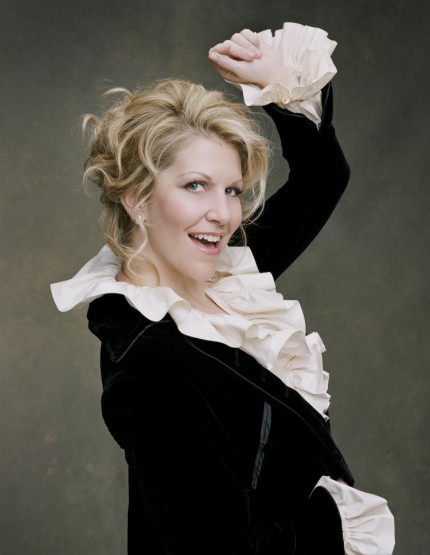DiDonato triumphs in Chicago recital debut
“I like to hit the ground running,” said Joyce DiDonato after opening her recital Friday night with a staggering bravura account of Haydn’s dramatic concert aria, Scena di Berenice.
The American mezzo-soprano has been a familiar figure on the opera stage in Chicago—most recently as Cherubino in last season’s Le nozze di Figaro at Lyric—yet Friday’s event at Mandel Hall, amazingly, marked DiDonato’s belated Chicago recital debut.
The vocal recital is clearly an endangered species even in a city as rich in musical variety as Chicago. There are scant downtown solo vocal events and those that do exist are usually limited to well-established stars like Renée Fleming or Dmitri Hvorostovsky (the latter heard Wednesday night at Orchestra Hall).
Yet clearly an audience does exist as the greatly gifted DiDonato played to a virtually sold-out house Friday night, with a welcome contingent of young singers and music students in attendance.
The fast-rising mezzo’s program offered a virtual model of what a successful vocal recital should be, with an individual selection including several works likely new even to aficionados, served up with a huge dollop of engaging vocal charisma.
DiDonato’s instrument may be a bit monochromatic in color, but, like the just-retired Frederica von Stade, the singer makes up for any lack of tonal distinction with a polished technique, personal charm and an expressive engagement that sweeps all quibbles aside.
The singer believes that Rossini’s songs are unjustly underrated and proceeded to provide supreme advocacy in her varied Rossini set: an earthy romantic entreaty in L’invito, rapt sensitivity in La Partenza and heartfelt expression to Le Dodo des enfants. DiDonato capped the set with the fiery vibrant caprice she brought to the full-blooded title gypsy of Chanson de Zora.
Rossini’s opera music provided the highlight of the evening with Assisa appie d’un salice from Otello. DiDonato’s rendering of this extended, deeply felt lament was magnificent, beautifully sung and conveying all of Desdemona’s poignance and foreboding with extraordinarily assured bel canto style. Too bad about the electronic disturbances during the most hushed moments.
French music made up a large part of the program. A set of Cecile Chaminade’s inexplicably neglected songs proved a wonderful discovery, not least the drop-dead beautiful opener, Viens, mon bien-aime! DiDonato provided equally ardent advocacy in the rollicking spring-like vitality of Villanelle and the florid L’ete.
The segue from France to Italy was deftly traversed via the Frenchman Reynaldo Hahn’s Venezia, songs cast in the Venetian dialect. The soloist brought out winsome charm and the style of each setting, with notably vivid characterization and humor to the ensuing Italian songs.
DiDonato showed she can throw off the fireworks with the best of them in her encore of the showpiece Tanti affetti from Rossini’s La donna del lago, blazing through all the coloratura and bel canto hurdles with remarkable agility and pinpont precison.
Throughout the evening, pianist David Zobel was a full partner, his eloquent keyboard work on the same artistic level as his colleague.
A final encore of Harold Arlen’s Over the Rainbow from the Kansas-born singer made the ideal coda to the evening, rendered with a freshness and simplicity all the more moving for its understatement.
Kudos to the University of Chicago Presents series for showcasing this wonderful artist to local audiences.
